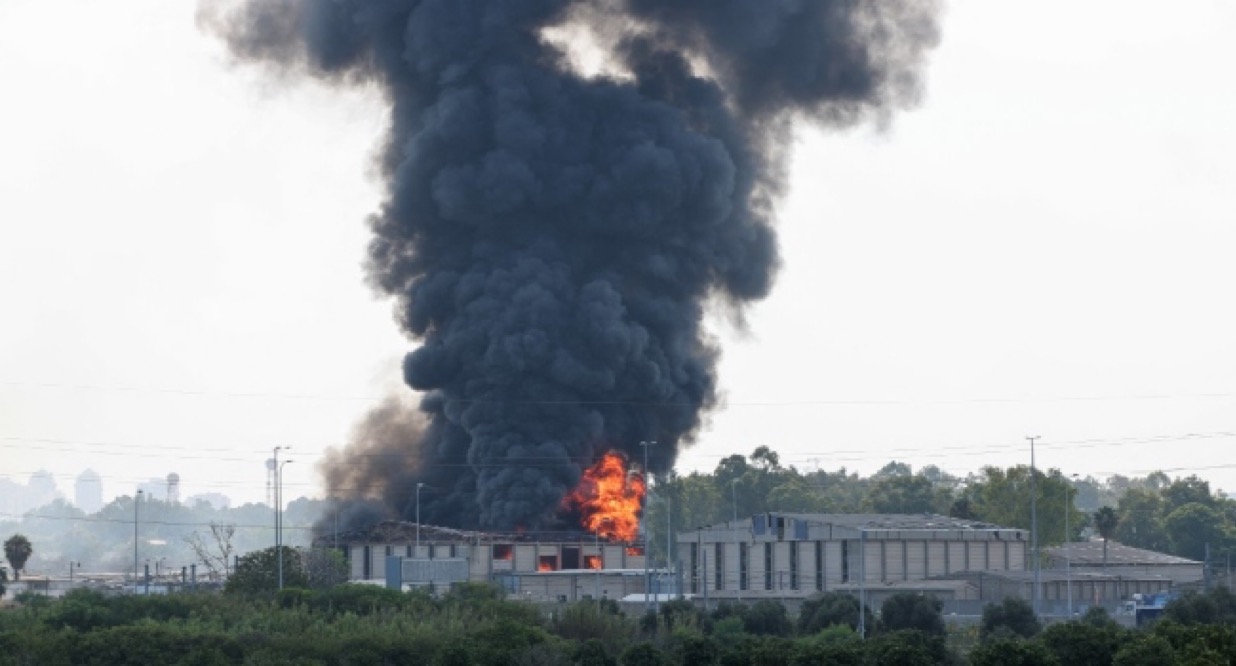Israel launched a significant airstrike on the headquarters of Iran’s state broadcaster, the Islamic Republic of Iran Broadcasting (IRIB), located in Tehran’s District Three, disrupting a live news broadcast. The attack occurred at approximately 2 a.m. local time, as anchor Sahar Emami was delivering a report on escalating regional tensions. Video footage captured the moment explosions rocked the studio, forcing Emami to flee as dust and debris filled the air, abruptly cutting off the transmission.
The Israeli military justified the strike, claiming the IRIB building served as a military hub for Iranian armed forces, operating under the guise of civilian infrastructure. No specific evidence was provided to substantiate these claims, prompting skepticism from international observers. The attack marked a bold escalation in the ongoing Israel-Iran conflict, which has intensified following tit-for-tat strikes over the past year.
Iran’s foreign ministry swiftly condemned the airstrike as a “war crime” and a “wicked act,” accusing Israel of violating international law by targeting a civilian media facility. The ministry issued a statement urging the United Nations Security Council to take immediate action to address what it described as Israel’s reckless aggression. Iranian officials reported that one IRIB worker was killed, with several others injured, though the exact casualty figures remain unverified.
The Committee to Protect Journalists (CPJ) issued a strong condemnation, highlighting Israel’s pattern of targeting media infrastructure, including attacks on journalists in Gaza and Lebanon. CPJ’s Middle East coordinator, Sherif Mansour, noted that the IRIB strike was a dangerous precedent, undermining press freedom in the region. Iranian journalist Younes Shadlou, a reporter for IRIB, stated that several colleagues were inside the building during the attack, despite Israel’s prior evacuation warnings for the area.
The airstrike followed Israel’s public threats to target Tehran’s District Three, a densely populated area housing government buildings, media outlets, and residential zones. On June 15, 2025, Israel’s defense ministry had issued a statement warning of imminent strikes on “strategic targets” in Iran, citing intelligence about Iranian military activities. The IRIB headquarters, a prominent symbol of Iran’s state media, was reportedly among the targets due to its alleged role in disseminating propaganda and coordinating military communications.
This incident is part of a broader escalation between Israel and Iran, fueled by years of covert operations, proxy conflicts, and direct military engagements. In recent months, Israel has intensified its airstrikes on Iranian-backed targets in Syria and Lebanon, while Iran has retaliated with missile and drone attacks on Israeli positions. The IRIB bombing has raised fears of a wider regional war, with analysts warning that such high-profile strikes could provoke a severe Iranian response.
International reactions have been mixed, with some Western governments expressing concern over the targeting of a media facility, while others reiterated support for Israel’s right to self-defense. The United Nations has called for de-escalation, with Secretary-General António Guterres urging both parties to exercise restraint to avoid a catastrophic conflict. Meanwhile, Iranian state media has vowed to continue broadcasting, with IRIB resuming operations from an alternate location hours after the attack.
The human toll of the strike remains a point of contention. Iranian authorities reported that emergency services were deployed to the IRIB site, where rescue operations continued into the morning of June 16. Local residents described scenes of chaos, with explosions lighting up the night sky and emergency vehicles struggling to navigate the crowded streets of District Three.
The attack has also sparked debate over the legality of targeting media infrastructure under international humanitarian law. The Geneva Conventions prohibit attacks on civilian objects unless they are being used for military purposes, a threshold that remains disputed in this case. Legal experts argue that Israel’s failure to provide concrete evidence of the IRIB’s military use could expose it to accusations of war crimes.
Public sentiment in Iran has been one of outrage, with thousands taking to social media to condemn the strike and express solidarity with IRIB staff. Protests erupted in Tehran on the morning of June 16, with demonstrators chanting anti-Israel slogans and calling for retaliation. Iran’s Supreme Leader, Ayatollah Ali Khamenei, issued a statement vowing a “harsh response” to what he described as Israel’s “brazen act of terrorism.”
The broader geopolitical implications of the airstrike are significant. Iran’s allies, including Russia and China, have issued statements criticizing Israel and calling for an end to unilateral military actions. The United States, a key Israeli ally, has remained cautious, with the State Department urging all parties to avoid actions that could spiral into a broader conflict.
The IRIB attack has also drawn attention to the role of media in modern warfare. Iran’s state broadcaster has long been a tool of the government, used to shape public opinion and counter Western narratives. Critics argue that IRIB’s close ties to the Islamic Revolutionary Guard Corps (IRGC) may have made it a legitimate target, while others maintain that attacking a media outlet, regardless of its affiliations, sets a dangerous precedent.
As of June 17, 2025, the situation remains tense, with both Israel and Iran preparing for potential further escalations. Israel has increased its military presence along its northern borders, anticipating possible retaliatory strikes from Iran or its proxies, such as Hezbollah. Iran, meanwhile, has signaled its intent to respond “at a time and place of its choosing,” raising fears of a new wave of violence in the region.
The international community continues to monitor the situation closely, with diplomatic efforts underway to prevent a full-scale war. The United Nations Security Council is scheduled to hold an emergency meeting on June 18 to discuss the crisis, though analysts remain skeptical about the prospects for a meaningful resolution. For now, the bombing of Iran’s state TV headquarters stands as a stark reminder of the fragility of peace in the Middle East.




